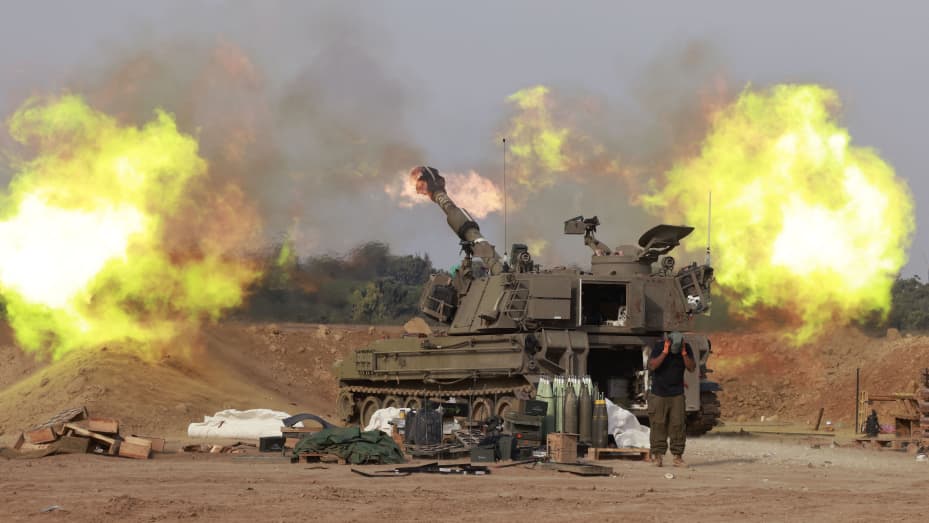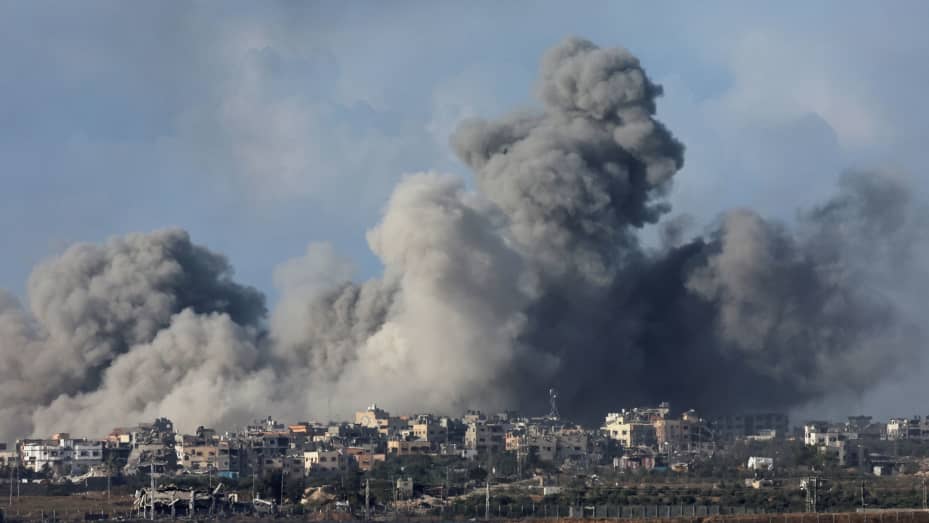Natasha Turak

Israel’s war against Hamas — which has turned the blockaded and then besieged Gaza Strip into a post-apocalyptic wasteland — is now in its third month.
The offensive, launched on Oct. 7 after Hamas militants killed some 1,200 people in Israel in a brutal terror attack and took another 240 hostage, has now killed more than 18,000 Palestinians in Gaza, health authorities there say. Hospitals have ceased to function, entire families have reportedly been wiped off the registry and scores of aid workers and journalists are among those killed.
The aim, Israel’s government says, is to fully eliminate Hamas — it denies targeting civilians, although even its staunchest ally, the United States, is now saying that it must do more to protect civilian life.
Hamas, an Islamist militant and political organization designated as a terrorist group by the U.S. and European Union, has governed the Gaza Strip since 2007. It has a stated goal of destroying the state of Israel, which the United Nations classifies as an occupier over the Palestinian territories since 1967. In the years since Hamas took power in the small enclave, its capabilities, finances and weapons supplies have grown significantly, thanks to financial support from the likes of Iran and Qatar.
CNBC spoke to ten experts in counterterrorism, Middle Eastern history and security, and military operations to get their answers to the question: Can Hamas be, in fact, eliminated?
Hussein Ibish, senior resident scholar at the Arab Gulf States Institute in Washington
“No. Hamas is not a bunch of individuals, or a set of equipment and infrastructure. It’s a brand, and as long as there are a group of living Palestinians who want to call themselves Hamas, Hamas still exists. It is extremely stupid to declare a war aimed that cannot be accomplished. Yet this is what Israel has done. And unless the Israeli leadership begins to draw down its rhetoric about war aims, Israel perforce will fail because it has set itself unachievable goals and they are writing Hamas’s victory speech with their own proclamations.”
Retired Lt. Gen. Ben Hodges, former Commanding General of U.S. Army Europe
“To ‘eliminate’ or destroy Hamas, Israel will have to destroy the root cause of Hamas, its reason for existence. That means Israel will have to accept progress towards a two-state solution and Palestinian statehood for Gaza and the West Bank.
Hamas cannot have a leading role in governing Gaza but Israel’s refusal to accept the two-state solution only guarantees continued efforts by Hamas to destroy Israel. Israel taking away that motivation, and getting the illegal settlement problem solved, will make it much easier for Arab nations to support Israel. It will also require the U.S. to put more pressure on Iran to stop supporting Hamas.
At the end of the day, IDF will kill a lot of Hamas and destroy much of their current network and infrastructure. But using lethal kinetic force only, without a political non-kinetic component to the strategy, is unlikely to lead to the ‘elimination’ of Hamas.”

Smoke rises over Gaza, amid the ongoing conflict between Israel and the Palestinian Islamist group Hamas, as seen from southern Israel on Dec. 9, 2023.
Retired Col. Miri Eisin, Israel Defense Forces; managing director of the International Institute for Counter-Terrorism
“Can Hamas be eliminated? Yes, the military portion can be eliminated in the sense that you can systematically destroy the weapons, the armaments, the production sites, the positions both above ground and below ground. It’s systematic, it’s slow, but that can be eliminated.
Hamas’ ideology is part of the issue. It’s also a social movement and a governance. How to ensure people don’t join Hamas is first and foremost, you have to show that that way does not bring about a better future. That means that hand in hand with defeating Hamas, you have to let the people in Gaza distinguish and try to define the future they want. If I’m not clear enough, if the future they want is the Hamas genocidal version of destroying Israel, then we are going to seclude them, sideline them and make sure that they cannot get to us.”
Ryan Bohl, senior Middle East and North Africa analyst, Rane
“Total eradication of Hamas requires for Israel to not only carry out a military campaign in the Gaza Strip but also now Lebanon, Syria, Iran and even potentially Qatar where Hamas has a presence. But even that is pretty far-fetched given that the IDF hasn’t even successfully eradicated Hamas from the West Bank, which Israel more thoroughly controls.
Hamas, like all militant organizations, has the capacity to reorganize and replace lost fighters and leadership so long as the deeper social and political drivers towards its ideology remain present. The only viable way that Hamas could cease to exist is if those ideological drivers disappear or the organization is supplanted by a rival militant group.”
Daniel Byman, director, Georgetown University Security Studies Program
“Hamas is very difficult to eliminate. It has substantial support in Gaza, at least compared with its rivals. In addition, it has deep educational, social welfare, and religious ties as well as being the de-facto government of Gaza. All this means that Israel could kill many Hamas leaders and still not eliminate the organization. The best hope would be to try to keep Hamas weak and off balance while building up rivals, such as the Palestinian Authority — but that is a long-term solution and a difficult one.”

Palestinian fighters from the military wing of Hamas take part in a military parade near the border with Israel, to commemorate the 2014 war, which lasted for 51 days of the Israeli-Palestinian conflict.
Michael Knights, senior fellow at The Washington Institute; co-founder, Militia Spotlight platform
“Military campaigns such as the Second World War against Nazism or the war against ISIS don’t eliminate the ideology or even all remnants of the terror regime, but that’s not the point. The point is to get a regime like Hamas as close to elimination as possible with military means, and then hand off a more manageable task to policing and counter-terrorism forces, judiciaries, and political and economic processes.”
Jack Watling, senior research fellow for Land Warfare at the Royal United Services Institute
“It is realistic for the IDF to degrade Hamas’s military capabilities through their ground operation by killing its fighters and destroying their stockpiles of equipment. Furthermore, the removal of Hamas from control of Gaza can deny them the infrastructure that they had used to pose a serious and sustained threat to Israel.
The ideology will not be destroyed, nor will Hamas as an organization. Nevertheless, Israel probably feels it can better manage a terrorist group than a hostile proto-state.”
Natan Sachs, director, Brookings Institution Center for Middle East Policy
“Hamas cannot be totally eliminated as an organization or an ideology, but that is not the Israeli goal, precisely. Its ideology is well-rooted in Palestinian society and draws from the broader Muslim Brotherhood family of organizations.
But Israel’s goal is actually more limited, it aims to destroy Hamas’s ability to govern the Gaza Strip or to pose a military threat from the Gaza Strip to Israeli civilians as in the October 7th massacre. This is a very difficult task, but one that can be achieved at great cost to the civilian population in Gaza and to Israel. The unresolved question is what or who will govern the Gaza Strip if and when Hamas is toppled completely from power there.”
Dave Des Roches, associate professor at Near East South Asia Center for Strategic Studies, National Defense University
“Can Hamas be eliminated? Yes, it is possible to destroy any military organization, even one which claims a religious justification. Defeating it would require a complete destruction of its command network and most of its weapons facilities. This is not an easy task, and will probably not be possible without occupying most of all of Gaza for at least some period of time.
So in order to truly defeat Hamas, the critical aspect is to ensure that Palestinians are free to reject Hamas, if they so chose. What that means is that Hamas adherents must lose the ability to impose their will on Palestinians who chose not to follow them – Hamas will have to lose its weapons and any ability to operate covertly in Gaza. This means that there will have to be a political entity which is capable of policing Gaza which is not Hamas. That is unlikely.”
No comments:
Post a Comment